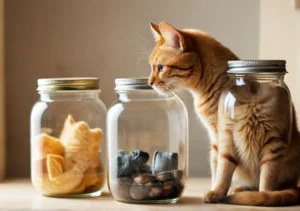Cats have a reputation for being incredibly sensitive creatures, especially when it comes to essential oils. But why exactly are cats so sensitive to these oils? Let’s explore the reasons behind this fascinating phenomenon.
The Sense of Smell in Cats
Cats have an incredible sense of smell, which is estimated to be around 14 times more sensitive than that of humans. This heightened olfactory ability allows them to detect scents that we would never even notice. With such a keen sense of smell, it’s no wonder that essential oils can have a significant impact on our feline friends.
Cats use their sense of smell for a variety of purposes, from hunting prey to marking their territory. This means that when they encounter strong scents like those found in essential oils, it can easily overwhelm their delicate senses. As a result, even small amounts of essential oils can cause discomfort or harm to cats.
Toxicity Concerns
Essential oils contain compounds that can be toxic to cats, such as phenols, terpenes, and ketones. These substances can be harmful to their liver, nervous system, and even respiratory system when inhaled or ingested. Even diluted essential oils can be dangerous for cats, so it’s essential to exercise caution when using them around your furry companions.
Some essential oils that are especially toxic to cats include tea tree, peppermint, citrus, and lavender. These oils can cause symptoms ranging from nausea and vomiting to tremors and seizures in cats. It’s crucial to keep all essential oils out of reach of your cats and consult with a veterinarian before using any products that contain them.
Remember, our feline friends rely heavily on their sense of smell, and exposing them to strong scents like essential oils can have serious consequences. Always prioritize your cat’s health and well-being by avoiding the use of essential oils around them.
Respiratory Issues
Did you know that cats have sensitive respiratory systems? When exposed to essential oils, our feline friends can experience some serious respiratory issues. Inhaling these potent oils can lead to symptoms like coughing, sneezing, and difficulty breathing in cats. It’s important to keep this in mind and avoid using essential oils around your furry companions to prevent any respiratory distress.
Additionally, some essential oils contain compounds that may be toxic to cats when inhaled, further exacerbating respiratory problems. These compounds can irritate the delicate lining of a cat’s respiratory tract, causing inflammation and discomfort. So next time you’re diffusing essential oils in your home, consider your cat’s health and well-being by opting for pet-safe alternatives. After all, their health is our top priority!
Skin Irritation
Another reason why cats are sensitive to essential oils is the potential for skin irritation. When essential oils come into contact with a cat’s skin, it can lead to redness, itching, and even skin damage. Cats groom themselves frequently, so any essential oil residue on their fur can be easily ingested during grooming, causing further complications.
To prevent skin irritation in your feline friend, avoid direct contact with essential oils on their skin or fur. If you’re using essential oils in your home, make sure your cat doesn’t come into contact with any surfaces or objects that have been treated with these oils. It’s essential to prioritize your cat’s skin health and overall well-being by being mindful of the products you use around them.
Unique Insight: Did you know that cats lack certain enzymes in their liver that help metabolize essential oils? This makes them more susceptible to the adverse effects of these potent substances, especially when it comes to skin irritation and other health issues. So always exercise caution when using essential oils around your beloved feline companions!
Behavioral Changes
When it comes to cats and essential oils, it’s crucial to be aware of the potential behavioral changes your feline friend may exhibit when exposed to certain scents. Cats are known for their sensitive noses, and essential oils can overwhelm their olfactory system, leading to increased agitation, irritability, or avoidance of certain areas in your home. If you notice your cat acting differently when you diffuse essential oils or use them in cleaning products, it’s essential to remove your cat from the area and ventilate the space to help them feel more comfortable.
Alternative Options
If you’re looking for safer alternatives to using essential oils around your cat, there are plenty of natural remedies and feline-friendly products available. Catnip, silver vine, and valerian root are all safe options for providing calming effects for your cat without the risk of sensitivities to essential oils. Additionally, unscented or mildly scented cleaning products can help you keep your home fresh without causing any harm to your pet. When in doubt, always consult with your veterinarian to ensure you’re providing the safest environment for your furry friend.
- Catnip: A popular herb that provides a natural calming effect for cats
- Silver Vine: Another safe alternative to essential oils that can help relax your cat
- Valerian Root: A natural remedy that promotes relaxation and reduces stress in felines
- Unscented Products: Opt for cleaning products with minimal to no scent to avoid triggering sensitivities in your cat
- Consult Your Vet: Always seek professional advice when choosing products for your cat’s environment.
Consulting a Veterinarian
Before using any essential oils around your precious feline friend, it’s crucial to consult a veterinarian. These professionals are experts in understanding your cat’s unique needs and can give you personalized advice on how to keep them safe. Remember, your vet is your best ally in ensuring your cat’s safety and well-being.
Interesting Facts About Cats and Essential Oils
Did you know that cats lack a liver enzyme called glucuronyl transferase, which helps process essential oils in their bodies? This enzyme deficiency makes cats especially sensitive to essential oils, as their bodies can’t break down and eliminate the oils effectively. That’s why it’s essential to be cautious when using these potent substances around your furry friend.
- Cats have a heightened sense of smell, making them more susceptible to the strong scents of essential oils. What might smell pleasant to you could be overwhelming for your cat.
- It’s not just the smell that affects cats; the oils can also be absorbed through their skin or ingested when they groom themselves, leading to potential toxicity issues.
- Always dilute essential oils if you must use them around your cat, and only do so under the guidance of your veterinarian to minimize any risks.
- Keep essential oils securely stored out of your cat’s reach to prevent accidental exposure. Remember, prevention is key to keeping your feline friend safe and healthy.
By knowing these facts and working closely with your vet, you can ensure that your cat stays happy and healthy while enjoying the benefits of essential oils in your home.
Alex, a passionate animal lover, has experience in training and understanding animal behavior. As a proud pet parent to two dogs and three cats, he founded AnimalReport.net to share insights from animal experts and expand his knowledge of the animal kingdom.




